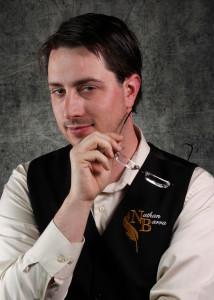All stories require at least two participants: the storyteller and the audience. While this is obvious in the performances of bards, campfire storytellers, and stage actors, I would argue that writers are also intrinsically performers. We simply project that experience across space and time. And yet, writers and non-writers alike seem fixated on the idea that authors must be introverts to be successful. This is only true to a point.
Writers must be comfortable spending hours at a time in solitude. We need the time free from distractions to produce and polish our fiction. For that sort of work, having an introverted personality is very helpful. However, we must also be able to interact with fans and fellow professionals at conventions, book signings, and via social media. We must be able to promote ourselves to our target audience, discuss craft in an intelligent and thoughtful manner, and interact as business people. As such, writers must also be extroverted. Or have spent the time stocking our social toolbox with the extrovert’s tricks and tools.
Though the idea of an extroverted introvert seems like a fundamental conflict in dichotomy, I disagree. It really depends on how you look at the whole situation. You see, much of the discussion on introversion/extroversion recently has treated the issue as a matter of extremes. The dialog has taught us to think of them as two separate things. Instead, I believe that the difference between introverts and extroverts is more of a matter of where the individual gets their psychological and social energy, rather than being a fundamental characteristic of personality and social skills.
I am an introvert. I am a writer and an engineer. I spend most working days at my bread job in my office running calculations, researching, and solving problems. I collaborate, sure, but I can always retreat to my office and close the door when I need to focus. On the other hand, parties are work for me. I often enjoy myself, but leave the gathering feeling mentally and emotionally drained. I have to expend effort to be social, and will often feel refreshed after a weekend spent alone working on writing, watching movies, bicycling, and reading.
In contrast, I have a friend who is an extrovert. Let’s call her Jane. Jane recently started a job as an ER nurse, and so she is constantly interacting with patients, doctors, and other people. When we met in college, Jane lived in her sorority’s house, a building which was packed full of her sisters. When I expressed that I couldn’t live that way, she smiled and wistfully told me that she loved the energy of the house. When Jane surrounds herself with people, she’s excited and energetic. By my definition, she’s a classic extrovert.
That’s not to say that I don’t enjoy being around people, because I do. My groups just tend to be smaller than Jane’s. The most important thing to note about Jane and I is that we are both capable of functioning alone and in groups of people. It just takes effort. Jane is much better with people and social interaction than I am because she enjoys doing so and has had more practice. She’s helped me catch up over the years and taught me tricks and behaviors that I can use as an introvert to appear to be extroverted.
Social skills can be learned, practiced and perfected. At first I was faking my extroversion, but over the years, I’ve crept away from one extreme and now rest happily closer to the middle. In fact, people now insist that I must be extroverted. In my time at conventions, I’ve seen writers flub fan interactions. They may try to brush their behavior aside with the excuse “but I’m an introvert,” but they still lost a fan. Bad news for a businessperson. If they had practiced their extroverted skills that wouldn’t have happened.
Okay Nathan, you’ve convinced me that extroversion is important, but where can I start? Good question! Here are my top 10 favorite tips for being an extroverted introvert.
- BE GENUINE – Most people are very good at reading subtle body language cues and will know if you are faking interest in them. So, don’t try to fake it. Instead find common ground that you and the other person share as a passion. (Hint: This is what small talk is designed to do!) Then, you can be genuinely interested in the conversation. This also extends to insincere compliments. Just don’t do it.
- SMILE – People want to know you enjoy their company. One of the easiest ways to express this is through a simple smile. You don’t have to grin. In fact don’t as that is creepy. Even a small and genuine smile makes a big difference. Again, remember tip number 1. Try an experiment with me. For the next week, each time you approach someone make brief eye contact and smile at them. I promise that it’ll change how people interact with you.
- REMEMBER PEOPLE’S NAMES – I suck at remembering people’s names. It’s no excuse. Do whatever memory tool/covert glancing at badges it takes to address people by their first name. This will make them feel important and therefore more favorable towards you. One of the smartest businessmen I’ve ever known once told me that the key to success is remembering people’s names. Considering that he now runs a trucking empire that started with him driving a single pickup truck, I’d tend to believe him.
- BEING TIRED IS NO EXCUSE FOR BEING RUDE – For introverts, working a convention is hard. It exhausts us, makes our feet ache and puts us in a fowl mood. These are all personal problems. Our fans are at conventions to interact with us. When you are in any public space whatsoever you must have your game face on 100% of the time. Make sure each and every interaction is a positive one.
- NEVER APOLOGIZE FOR EXHAUSTION – As a corollary to tip 4, never call attention to the fact that you are tired by apologizing for it. Chances are, if you are doing your job they didn’t notice. By apologizing, you’ve made the other person feel like they are imposing on you, which isn’t a positive experience. However, if you’ve accidentally been rude or dismissive, be sure to apologize for that and be genuine.
- LET THE OTHER PERSON DO THE TALKING – “People have two ears and one mouth for a reason. Use them in their proper proportion.” ~ Jane. A benefit of this approach is that you get to conserve your social energies. All you have to do is listen, reword and repeat what they’ve said at appropriate intervals, and then ask them leading questions. Conventions are about your fans, their experiences and what they want out of you. Let them be selfish and hog the conversation. If they start apologizing for doing so, refuse their apology and insist that you are interested in what they say and ask them to go on. After an appropriate amount of time has passed, find a way to delicately remove yourself from the conversation.
- MASTER THE ART OF THE SOFT SELL – Nobody likes feeling pressured to spend money. Everyone you interact with on a convention floor is a person, not a mark. If you make selling to someone a difficult or unpleasant experience, people will start avoiding you. Instead, try to form a real bond with the person you are selling and if the opportunity comes up to talk about you or your work, be casual about it. Put the book in their hand and see if they buy. If it doesn’t come up, wish them a happy con and let them walk away. No social interaction is wasted time. Who knows, they may remember that nice author that took time to talk to them and look you up when they get home.
- IF SOMEONE IS RUDE OR HOSTILE TO YOU, KEEP YOUR COOL – You are a professional, and professionals don’t get into shouting matches on the convention floor. Especially if the other person deserves it. Stand up for yourself as necessary, walk away when you can, but always maintain your dignity and composure. The person who loses their cool first is the person who loses. Let them make an ass of themselves.
- TAKE RE-ENERGIZING BREAKS – I always have a set of ear buds on me when I’m at a convention. If I get flustered or need a moment, I find an uncrowded restroom, close myself in a stall, and listen to something loud and energetic for five minutes. I love music. It energizes me, helps me find my center, and lets me feel alone even when surrounded by people. It’s amazing how refreshing a small break is when you’ve been on the con floor all day. Experiment and find your re-energizing activity. Indulge for five minutes (set a timer if you have to) and then go back to work.
- NEVER EVER CRITICIZE ANYONE OR ANYTHING FOR ANY REASON, ESPECIALLY IF PROMPTED TO DO SO – Remember, fans attend cons for positive experiences. Not only is it tactless to criticize someone who can’t defend themselves, it makes you look bad. Remember the old adage, if you don’t have anything nice to say, be noncommittal or change the subject. Would you rather so-and-so hear that you’ve been singing their praises or criticizing their work? Writers travel in small circles, so we hear about what others are saying about us.
Writers are semi-public figures, and so we must have the skills to appear to be extroverted especially if we are not. We don’t get stalked by paparazzi or stopped on the streets by adoring fans, but we still need to be able to function in large groups. We need to be able to have meaningful interactions with complete strangers in the time it takes to sign a book and hand it back. We need to be able to feel comfortable to conduct business for the entire duration of a weekend convention. Ten years ago, I would have found that daunting. I hadn’t practiced my extroverted skills, and so it took Jane’s advice, and one of her favorite books (Dale Carnegie’s How to Win Friends and Influence People) to teach me the importance of those skills and how to use them for my own benefit. I might not be an extrovert, but I’ve faked it so long that it has become somewhat true. In the end, that’s what matters.
About the Author:
Though Nathan Barra is an engineer by profession, training and temperament, he is a storyteller by nature and at heart. Fascinated with the byplay of magic and technology, Nathan is drawn to science fantasy in both his reading and writing. He has been known, however, to wander off into other genres for “funzies.” Visit him at his webpage or Facebook Author Page.









